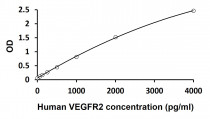ARG81425
Human VEGFR2 ELISA Kit
Human VEGFR2 ELISA Kit for ELISA and Human
Component
| Cat No | Component Name | Package | Temp |
|---|---|---|---|
| ARG81425-001 | Antibody-coated microplate | 8 X 12 strips | 4°C. Unused strips should be sealed tightly in the air-tight pouch. |
| ARG81425-002 | Standard | 2 X 10 ng/vial | 4°C |
| ARG81425-003 | Standard/Sample diluent | 30 ml (Ready to use) | 4°C |
| ARG81425-004 | Antibody conjugate concentrate (100X) | 1 vial (100 µl) | 4°C |
| ARG81425-005 | Antibody diluent buffer | 12 ml (Ready to use) | 4°C |
| ARG81425-006 | HRP-Streptavidin concentrate (100X) | 1 vial (100 µl) | 4°C |
| ARG81425-007 | HRP-Streptavidin diluent buffer | 12 ml (Ready to use) | 4°C |
| ARG81425-008 | 25X Wash buffer | 20 ml | 4°C |
| ARG81425-009 | TMB substrate | 10 ml (Ready to use) | 4°C (Protect from light) |
| ARG81425-010 | STOP solution | 10 ml (Ready to use) | 4°C |
| ARG81425-011 | Plate sealer | 4 strips | Room temperature |
Overview
| Product Description | ARG81425 Human VEGFR2 ELISA Kit is an Enzyme Immunoassay kit for the quantification of Human VEGFR2 in serum, plasma (heparin, EDTA) and cell culture supernatants. |
|---|---|
| Tested Reactivity | Hu |
| Tested Application | ELISA |
| Specificity | There is no detectable cross-reactivity with other relevant proteins. |
| Target Name | VEGFR2 |
| Conjugation | HRP |
| Conjugation Note | Substrate: TMB and read at 450 nm. |
| Sensitivity | 31.25 pg/ml |
| Sample Type | Serum, plasma (heparin, EDTA) and cell culture supernatants. |
| Standard Range | 62.5 - 4000 pg/ml |
| Sample Volume | 100 µl |
| Precision | Intra-Assay CV: 6.8% Inter-Assay CV: 7.7% |
| Alternate Names | FLK1; VEGFR; CD antigen CD309; FLK-1; Fetal liver kinase 1; VEGFR2; Vascular endothelial growth factor receptor 2; VEGFR-2; CD309; Kinase insert domain receptor; EC 2.7.10.1; Protein-tyrosine kinase receptor flk-1; KDR |
Application Instructions
| Assay Time | ~ 5 hours |
|---|
Properties
| Form | 96 well |
|---|---|
| Storage Instruction | Store the kit at 2-8°C. Keep microplate wells sealed in a dry bag with desiccants. Do not expose test reagents to heat, sun or strong light during storage and usage. Please refer to the product user manual for detail temperatures of the components. |
| Note | For laboratory research only, not for drug, diagnostic or other use. |
Bioinformation
| Database Links |
Swiss-port # P35968 Human Vascular endothelial growth factor receptor 2 |
|---|---|
| Gene Symbol | KDR |
| Gene Full Name | kinase insert domain receptor |
| Background | Vascular endothelial growth factor (VEGF) is a major growth factor for endothelial cells. This gene encodes one of the two receptors of the VEGF. This receptor, known as kinase insert domain receptor, is a type III receptor tyrosine kinase. It functions as the main mediator of VEGF-induced endothelial proliferation, survival, migration, tubular morphogenesis and sprouting. The signalling and trafficking of this receptor are regulated by multiple factors, including Rab GTPase, P2Y purine nucleotide receptor, integrin alphaVbeta3, T-cell protein tyrosine phosphatase, etc.. Mutations of this gene are implicated in infantile capillary hemangiomas. [provided by RefSeq, May 2009] |
| Function | Tyrosine-protein kinase that acts as a cell-surface receptor for VEGFA, VEGFC and VEGFD. Plays an essential role in the regulation of angiogenesis, vascular development, vascular permeability, and embryonic hematopoiesis. Promotes proliferation, survival, migration and differentiation of endothelial cells. Promotes reorganization of the actin cytoskeleton. Isoforms lacking a transmembrane domain, such as isoform 2 and isoform 3, may function as decoy receptors for VEGFA, VEGFC and/or VEGFD. Isoform 2 plays an important role as negative regulator of VEGFA- and VEGFC-mediated lymphangiogenesis by limiting the amount of free VEGFA and/or VEGFC and preventing their binding to FLT4. Modulates FLT1 and FLT4 signaling by forming heterodimers. Binding of vascular growth factors to isoform 1 leads to the activation of several signaling cascades. Activation of PLCG1 leads to the production of the cellular signaling molecules diacylglycerol and inositol 1,4,5-trisphosphate and the activation of protein kinase C. Mediates activation of MAPK1/ERK2, MAPK3/ERK1 and the MAP kinase signaling pathway, as well as of the AKT1 signaling pathway. Mediates phosphorylation of PIK3R1, the regulatory subunit of phosphatidylinositol 3-kinase, reorganization of the actin cytoskeleton and activation of PTK2/FAK1. Required for VEGFA-mediated induction of NOS2 and NOS3, leading to the production of the signaling molecule nitric oxide (NO) by endothelial cells. Phosphorylates PLCG1. Promotes phosphorylation of FYN, NCK1, NOS3, PIK3R1, PTK2/FAK1 and SRC. [UniProt] |
| Highlight | Related products: VEGFR antibodies; VEGFR ELISA Kits; New ELISA data calculation tool: Simplify the ELISA analysis by GainData |
| PTM | N-glycosylated. Ubiquitinated. Tyrosine phosphorylation of the receptor promotes its poly-ubiquitination, leading to its degradation via the proteasome or lysosomal proteases. Autophosphorylated on tyrosine residues upon ligand binding. Autophosphorylation occurs in trans, i.e. one subunit of the dimeric receptor phosphorylates tyrosine residues on the other subunit. Phosphorylation at Tyr-951 is important for interaction with SH2D2A/TSAD and VEGFA-mediated reorganization of the actin cytoskeleton. Phosphorylation at Tyr-1175 is important for interaction with PLCG1 and SHB. Phosphorylation at Tyr-1214 is important for interaction with NCK1 and FYN. Dephosphorylated by PTPRB. Dephosphorylated by PTPRJ at Tyr-951, Tyr-996, Tyr-1054, Tyr-1059, Tyr-1175 and Tyr-1214. The inhibitory disulfide bond between Cys-1024 and Cys-1045 may serve as a specific molecular switch for H(2)S-induced modification that regulates VEGFR2 function. [UniProt] |
Images (1) Click the Picture to Zoom In
| Title | Download Link |
|---|---|
| ARG81425 Human VEGFR2 ELISA Kit User's manual |
 Download Download
|






